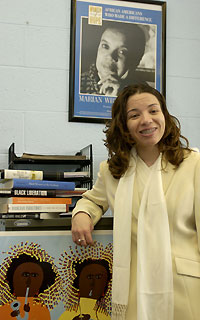For more archives, go to the Advance Archive/Search Page.
Political Scientist Constructs
Measure Of Black Feminism
Researchers who study racial discrimination, and those who study sexual discrimination, are missing the point if they don't study both together, says a UConn political scientist who is doing just that.

|
|
Evelyn Simien, assistant professor of political science.
Photo by Dollie Harvey
|
"Few people study the intersection of race and gender consciousness, which I refer to as black feminist consciousness," says Evelyn Simien. "Simply focusing on race or gender as separate entities, rather than the intersection of the two, effectively conceals the political orientations, attitudes, and political behavior of black women. They get subsumed within these groups."
Simien, who joined the UConn faculty in 2001, holds a joint appointment in political science and African American Studies. Within the discipline of political science, she says she may be the only person studying black feminism: "It is studied in areas like sociology, history, and literature, but not in political science."
Simien constructed a measure of black feminism using data from the 1993-1994 National Black Politics Study, a telephone survey of 1,206 African Americans conducted by researchers from several universities. The respondents answered questions on black separatism, economic prospects, gender roles, and other issues.
A quantitative approach is key to Simien's current research. "Oftentimes, the work that comes out of women's studies and African American studies is qualitative," she says, "and doesn't draw upon survey research or quantitative methods."
Black women often must choose between supporting race or gender issues, she argues. "To support the feminist movement is to imply that you are more loyal to the women's movement than to civil rights," she says. "When the two are pitted against each other - black liberation versus women's rights - a black woman who is caught in the center of these two struggles will be forced to choose. And often, a black woman will choose race over gender, so as not to be labeled a traitor."
In one study, using data from the 1996 National Black Election Study conducted by a researcher at the University of California-Irvine, Simien examined whether a person's support for the women's movement detracted from their support for race consciousness. "I found that it does not," she says. "Actually, black women who support the women's movement report a higher sense of race-consciousness."
The same, she says, holds true for black men. "I believe the reason is that black men, given that they suffer from racial discrimination, are both cognizant of and sympathetic toward the plight of black women, who suffer from both race and sex discrimination," she says.
Simien has also studied African Americans' attitudes toward affirmative action and abortion. Using data from the 1996 study, she examined how both race consciousness and black feminist consciousness influence opinions.
"Those who subscribed to black feminism supported abortion," Simien says. But support for black feminism did not similarly affect attitudes toward affirmative action. "Instead, it was race consciousness," she says. "I argue that abortion is clearly a gender issue, so it makes sense that black feminism would influence it. Since affirmative action is usually considered a black-white issue, race consciousness drives support for it."
Simien is currently writing a book on black feminist voices in politics. She says she hopes black feminist theory "can pave the way for black women's studies in political science."

